LAWS4005 Company Law: Examining Directors' Duties in Cassimatis
VerifiedAdded on 2023/06/03
|9
|3103
|208
Essay
AI Summary
This essay provides a legal and policy analysis of the Australian Securities and Investments Commission v Cassimatis case, focusing on the statutory duty of care and diligence outlined in s 180(1) of the Corporations Act 2001 (Cth). The first part examines Edelman J's judgment, particularly regarding the rejection of the argument that directors of solvent companies can pursue risky ventures if shareholders approve. It delves into the responsibilities of directors, the interests of the company, and the implications of breaching s 945A(1)(b) and 945A(1)(c). The second part analyzes the policy implications, contrasting the Australian approach with stakeholder-focused models in other countries like Germany and France. It discusses the balance between foreseeable risks, potential benefits, and the burden of taking alleviating actions, emphasizing that directors' duties extend beyond shareholder interests and include considerations of broader corporate interests and compliance with the law. The essay concludes that directors have a significant obligation to act with care and diligence, and their conduct should not be excused even in cases of honest mistake or negligence if it involves a high degree of departure from the required standard.
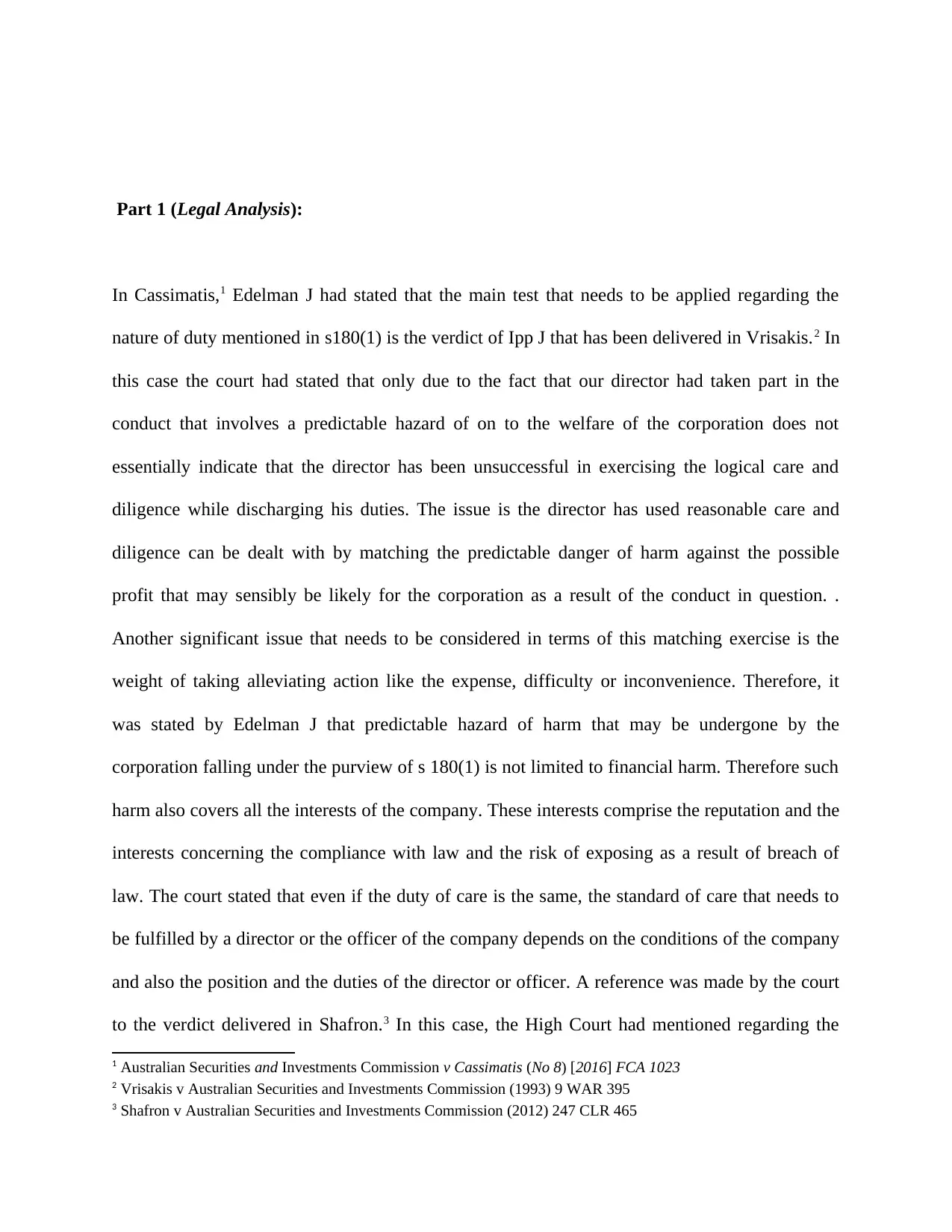
Part 1 (Legal Analysis):
In Cassimatis,1 Edelman J had stated that the main test that needs to be applied regarding the
nature of duty mentioned in s180(1) is the verdict of Ipp J that has been delivered in Vrisakis.2 In
this case the court had stated that only due to the fact that our director had taken part in the
conduct that involves a predictable hazard of on to the welfare of the corporation does not
essentially indicate that the director has been unsuccessful in exercising the logical care and
diligence while discharging his duties. The issue is the director has used reasonable care and
diligence can be dealt with by matching the predictable danger of harm against the possible
profit that may sensibly be likely for the corporation as a result of the conduct in question. .
Another significant issue that needs to be considered in terms of this matching exercise is the
weight of taking alleviating action like the expense, difficulty or inconvenience. Therefore, it
was stated by Edelman J that predictable hazard of harm that may be undergone by the
corporation falling under the purview of s 180(1) is not limited to financial harm. Therefore such
harm also covers all the interests of the company. These interests comprise the reputation and the
interests concerning the compliance with law and the risk of exposing as a result of breach of
law. The court stated that even if the duty of care is the same, the standard of care that needs to
be fulfilled by a director or the officer of the company depends on the conditions of the company
and also the position and the duties of the director or officer. A reference was made by the court
to the verdict delivered in Shafron.3 In this case, the High Court had mentioned regarding the
1 Australian Securities and Investments Commission v Cassimatis (No 8) [2016] FCA 1023
2 Vrisakis v Australian Securities and Investments Commission (1993) 9 WAR 395
3 Shafron v Australian Securities and Investments Commission (2012) 247 CLR 465
In Cassimatis,1 Edelman J had stated that the main test that needs to be applied regarding the
nature of duty mentioned in s180(1) is the verdict of Ipp J that has been delivered in Vrisakis.2 In
this case the court had stated that only due to the fact that our director had taken part in the
conduct that involves a predictable hazard of on to the welfare of the corporation does not
essentially indicate that the director has been unsuccessful in exercising the logical care and
diligence while discharging his duties. The issue is the director has used reasonable care and
diligence can be dealt with by matching the predictable danger of harm against the possible
profit that may sensibly be likely for the corporation as a result of the conduct in question. .
Another significant issue that needs to be considered in terms of this matching exercise is the
weight of taking alleviating action like the expense, difficulty or inconvenience. Therefore, it
was stated by Edelman J that predictable hazard of harm that may be undergone by the
corporation falling under the purview of s 180(1) is not limited to financial harm. Therefore such
harm also covers all the interests of the company. These interests comprise the reputation and the
interests concerning the compliance with law and the risk of exposing as a result of breach of
law. The court stated that even if the duty of care is the same, the standard of care that needs to
be fulfilled by a director or the officer of the company depends on the conditions of the company
and also the position and the duties of the director or officer. A reference was made by the court
to the verdict delivered in Shafron.3 In this case, the High Court had mentioned regarding the
1 Australian Securities and Investments Commission v Cassimatis (No 8) [2016] FCA 1023
2 Vrisakis v Australian Securities and Investments Commission (1993) 9 WAR 395
3 Shafron v Australian Securities and Investments Commission (2012) 247 CLR 465
Paraphrase This Document
Need a fresh take? Get an instant paraphrase of this document with our AI Paraphraser
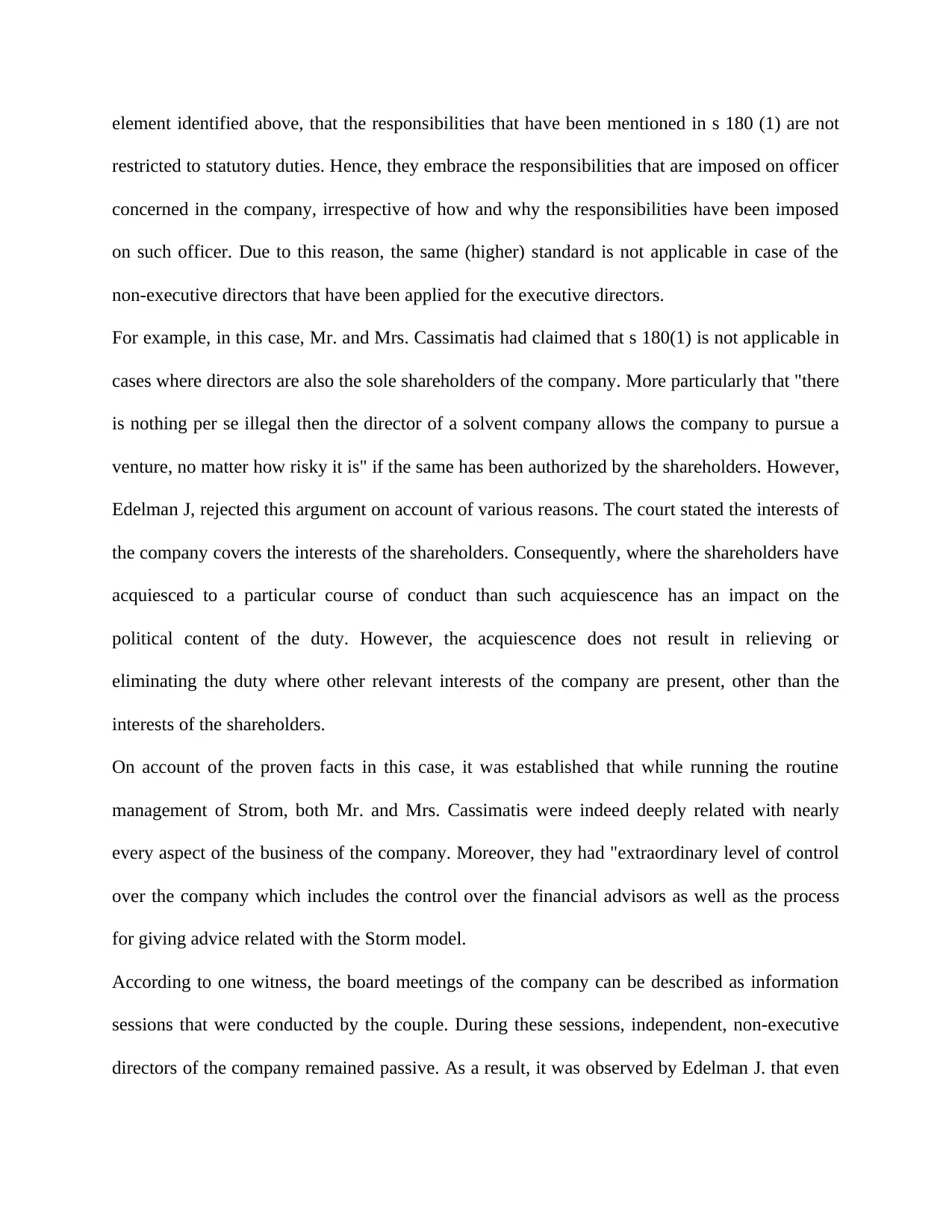
element identified above, that the responsibilities that have been mentioned in s 180 (1) are not
restricted to statutory duties. Hence, they embrace the responsibilities that are imposed on officer
concerned in the company, irrespective of how and why the responsibilities have been imposed
on such officer. Due to this reason, the same (higher) standard is not applicable in case of the
non-executive directors that have been applied for the executive directors.
For example, in this case, Mr. and Mrs. Cassimatis had claimed that s 180(1) is not applicable in
cases where directors are also the sole shareholders of the company. More particularly that "there
is nothing per se illegal then the director of a solvent company allows the company to pursue a
venture, no matter how risky it is" if the same has been authorized by the shareholders. However,
Edelman J, rejected this argument on account of various reasons. The court stated the interests of
the company covers the interests of the shareholders. Consequently, where the shareholders have
acquiesced to a particular course of conduct than such acquiescence has an impact on the
political content of the duty. However, the acquiescence does not result in relieving or
eliminating the duty where other relevant interests of the company are present, other than the
interests of the shareholders.
On account of the proven facts in this case, it was established that while running the routine
management of Strom, both Mr. and Mrs. Cassimatis were indeed deeply related with nearly
every aspect of the business of the company. Moreover, they had "extraordinary level of control
over the company which includes the control over the financial advisors as well as the process
for giving advice related with the Storm model.
According to one witness, the board meetings of the company can be described as information
sessions that were conducted by the couple. During these sessions, independent, non-executive
directors of the company remained passive. As a result, it was observed by Edelman J. that even
restricted to statutory duties. Hence, they embrace the responsibilities that are imposed on officer
concerned in the company, irrespective of how and why the responsibilities have been imposed
on such officer. Due to this reason, the same (higher) standard is not applicable in case of the
non-executive directors that have been applied for the executive directors.
For example, in this case, Mr. and Mrs. Cassimatis had claimed that s 180(1) is not applicable in
cases where directors are also the sole shareholders of the company. More particularly that "there
is nothing per se illegal then the director of a solvent company allows the company to pursue a
venture, no matter how risky it is" if the same has been authorized by the shareholders. However,
Edelman J, rejected this argument on account of various reasons. The court stated the interests of
the company covers the interests of the shareholders. Consequently, where the shareholders have
acquiesced to a particular course of conduct than such acquiescence has an impact on the
political content of the duty. However, the acquiescence does not result in relieving or
eliminating the duty where other relevant interests of the company are present, other than the
interests of the shareholders.
On account of the proven facts in this case, it was established that while running the routine
management of Strom, both Mr. and Mrs. Cassimatis were indeed deeply related with nearly
every aspect of the business of the company. Moreover, they had "extraordinary level of control
over the company which includes the control over the financial advisors as well as the process
for giving advice related with the Storm model.
According to one witness, the board meetings of the company can be described as information
sessions that were conducted by the couple. During these sessions, independent, non-executive
directors of the company remained passive. As a result, it was observed by Edelman J. that even
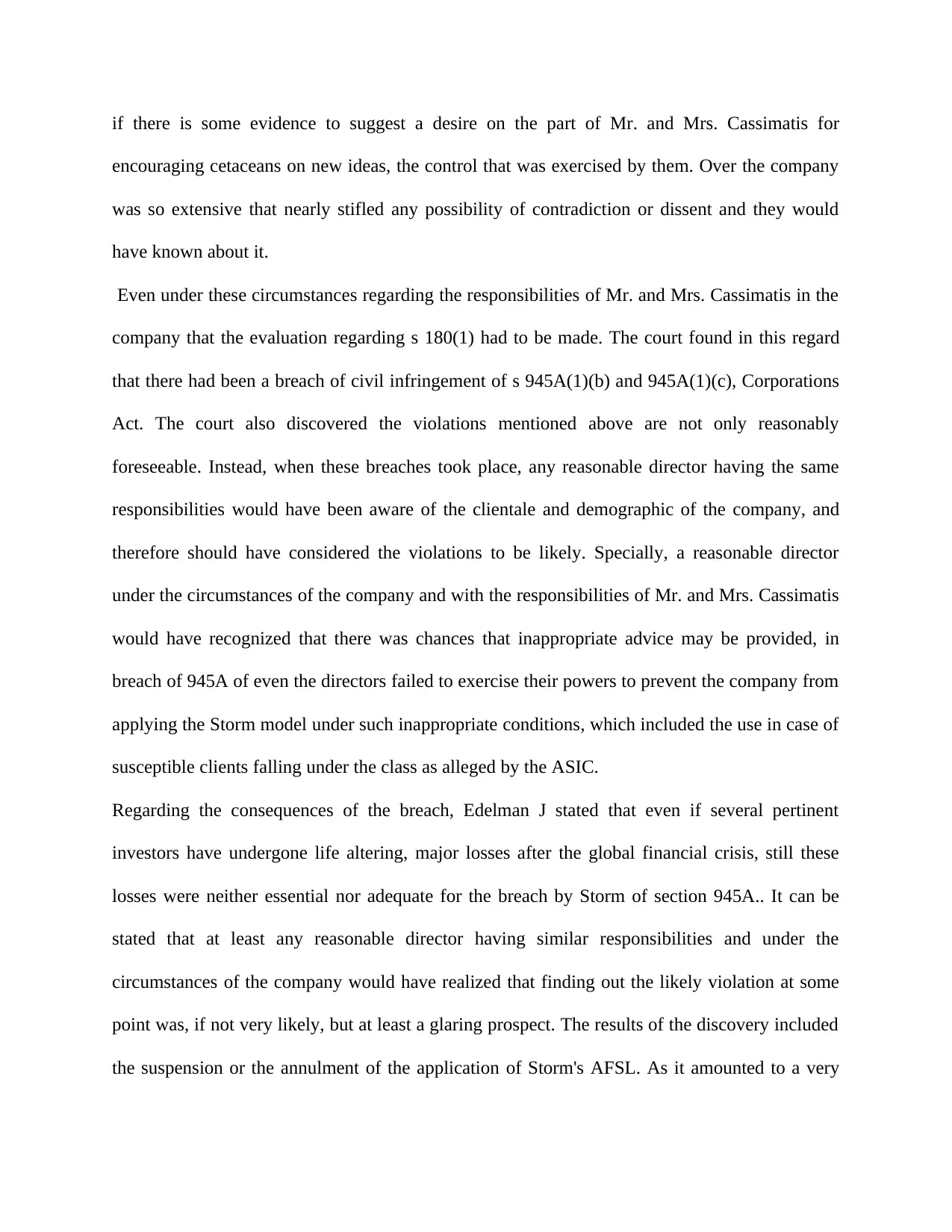
if there is some evidence to suggest a desire on the part of Mr. and Mrs. Cassimatis for
encouraging cetaceans on new ideas, the control that was exercised by them. Over the company
was so extensive that nearly stifled any possibility of contradiction or dissent and they would
have known about it.
Even under these circumstances regarding the responsibilities of Mr. and Mrs. Cassimatis in the
company that the evaluation regarding s 180(1) had to be made. The court found in this regard
that there had been a breach of civil infringement of s 945A(1)(b) and 945A(1)(c), Corporations
Act. The court also discovered the violations mentioned above are not only reasonably
foreseeable. Instead, when these breaches took place, any reasonable director having the same
responsibilities would have been aware of the clientale and demographic of the company, and
therefore should have considered the violations to be likely. Specially, a reasonable director
under the circumstances of the company and with the responsibilities of Mr. and Mrs. Cassimatis
would have recognized that there was chances that inappropriate advice may be provided, in
breach of 945A of even the directors failed to exercise their powers to prevent the company from
applying the Storm model under such inappropriate conditions, which included the use in case of
susceptible clients falling under the class as alleged by the ASIC.
Regarding the consequences of the breach, Edelman J stated that even if several pertinent
investors have undergone life altering, major losses after the global financial crisis, still these
losses were neither essential nor adequate for the breach by Storm of section 945A.. It can be
stated that at least any reasonable director having similar responsibilities and under the
circumstances of the company would have realized that finding out the likely violation at some
point was, if not very likely, but at least a glaring prospect. The results of the discovery included
the suspension or the annulment of the application of Storm's AFSL. As it amounted to a very
encouraging cetaceans on new ideas, the control that was exercised by them. Over the company
was so extensive that nearly stifled any possibility of contradiction or dissent and they would
have known about it.
Even under these circumstances regarding the responsibilities of Mr. and Mrs. Cassimatis in the
company that the evaluation regarding s 180(1) had to be made. The court found in this regard
that there had been a breach of civil infringement of s 945A(1)(b) and 945A(1)(c), Corporations
Act. The court also discovered the violations mentioned above are not only reasonably
foreseeable. Instead, when these breaches took place, any reasonable director having the same
responsibilities would have been aware of the clientale and demographic of the company, and
therefore should have considered the violations to be likely. Specially, a reasonable director
under the circumstances of the company and with the responsibilities of Mr. and Mrs. Cassimatis
would have recognized that there was chances that inappropriate advice may be provided, in
breach of 945A of even the directors failed to exercise their powers to prevent the company from
applying the Storm model under such inappropriate conditions, which included the use in case of
susceptible clients falling under the class as alleged by the ASIC.
Regarding the consequences of the breach, Edelman J stated that even if several pertinent
investors have undergone life altering, major losses after the global financial crisis, still these
losses were neither essential nor adequate for the breach by Storm of section 945A.. It can be
stated that at least any reasonable director having similar responsibilities and under the
circumstances of the company would have realized that finding out the likely violation at some
point was, if not very likely, but at least a glaring prospect. The results of the discovery included
the suspension or the annulment of the application of Storm's AFSL. As it amounted to a very
⊘ This is a preview!⊘
Do you want full access?
Subscribe today to unlock all pages.

Trusted by 1+ million students worldwide
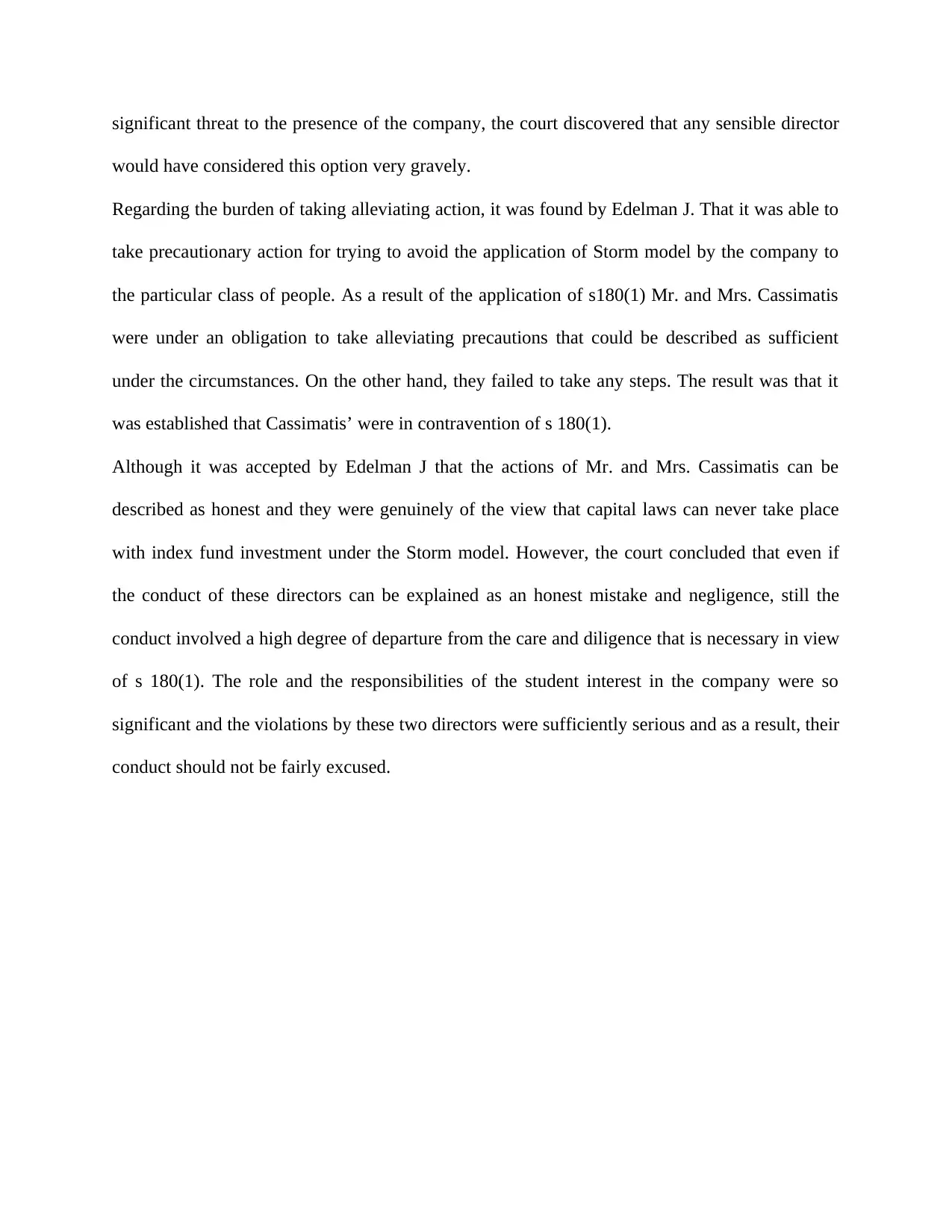
significant threat to the presence of the company, the court discovered that any sensible director
would have considered this option very gravely.
Regarding the burden of taking alleviating action, it was found by Edelman J. That it was able to
take precautionary action for trying to avoid the application of Storm model by the company to
the particular class of people. As a result of the application of s180(1) Mr. and Mrs. Cassimatis
were under an obligation to take alleviating precautions that could be described as sufficient
under the circumstances. On the other hand, they failed to take any steps. The result was that it
was established that Cassimatis’ were in contravention of s 180(1).
Although it was accepted by Edelman J that the actions of Mr. and Mrs. Cassimatis can be
described as honest and they were genuinely of the view that capital laws can never take place
with index fund investment under the Storm model. However, the court concluded that even if
the conduct of these directors can be explained as an honest mistake and negligence, still the
conduct involved a high degree of departure from the care and diligence that is necessary in view
of s 180(1). The role and the responsibilities of the student interest in the company were so
significant and the violations by these two directors were sufficiently serious and as a result, their
conduct should not be fairly excused.
would have considered this option very gravely.
Regarding the burden of taking alleviating action, it was found by Edelman J. That it was able to
take precautionary action for trying to avoid the application of Storm model by the company to
the particular class of people. As a result of the application of s180(1) Mr. and Mrs. Cassimatis
were under an obligation to take alleviating precautions that could be described as sufficient
under the circumstances. On the other hand, they failed to take any steps. The result was that it
was established that Cassimatis’ were in contravention of s 180(1).
Although it was accepted by Edelman J that the actions of Mr. and Mrs. Cassimatis can be
described as honest and they were genuinely of the view that capital laws can never take place
with index fund investment under the Storm model. However, the court concluded that even if
the conduct of these directors can be explained as an honest mistake and negligence, still the
conduct involved a high degree of departure from the care and diligence that is necessary in view
of s 180(1). The role and the responsibilities of the student interest in the company were so
significant and the violations by these two directors were sufficiently serious and as a result, their
conduct should not be fairly excused.
Paraphrase This Document
Need a fresh take? Get an instant paraphrase of this document with our AI Paraphraser
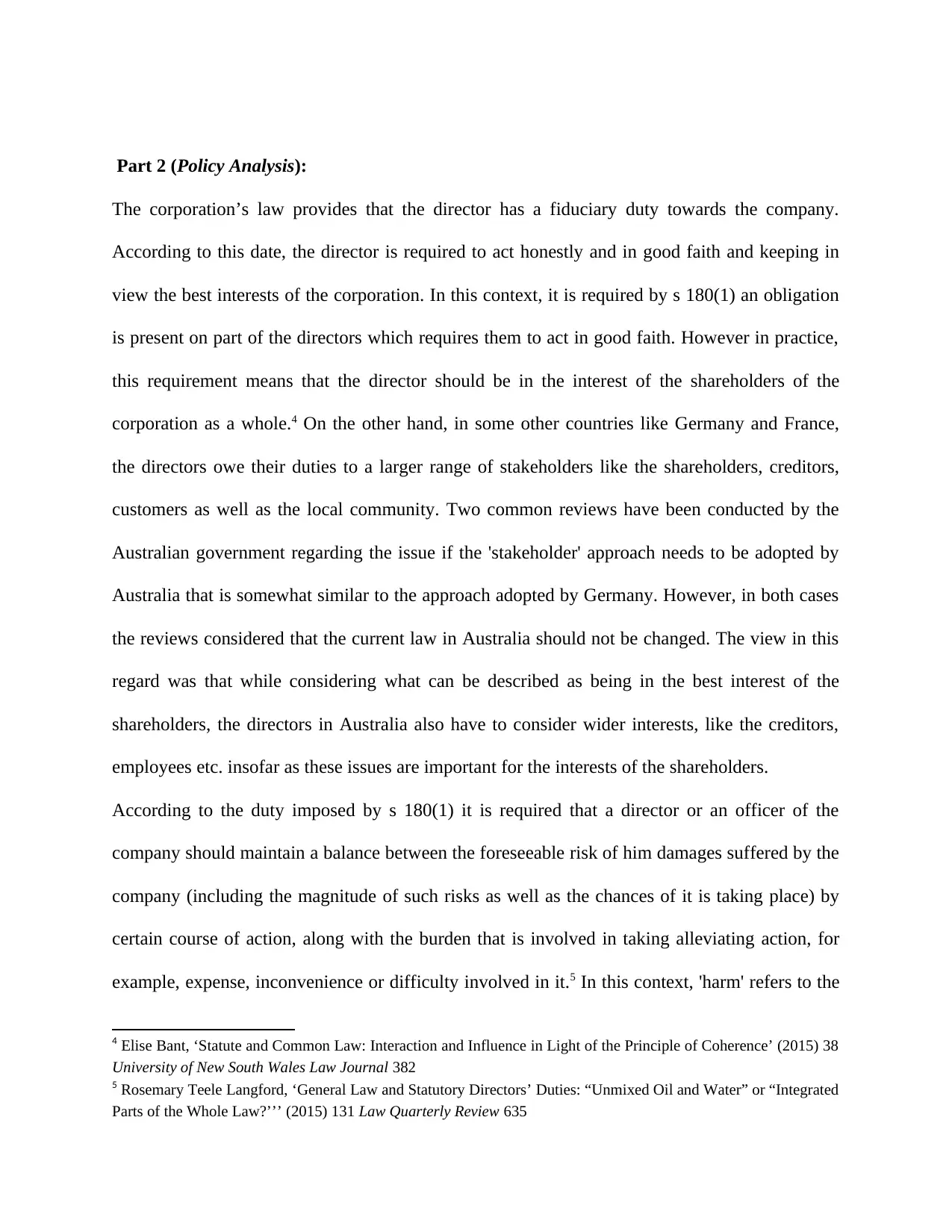
Part 2 (Policy Analysis):
The corporation’s law provides that the director has a fiduciary duty towards the company.
According to this date, the director is required to act honestly and in good faith and keeping in
view the best interests of the corporation. In this context, it is required by s 180(1) an obligation
is present on part of the directors which requires them to act in good faith. However in practice,
this requirement means that the director should be in the interest of the shareholders of the
corporation as a whole.4 On the other hand, in some other countries like Germany and France,
the directors owe their duties to a larger range of stakeholders like the shareholders, creditors,
customers as well as the local community. Two common reviews have been conducted by the
Australian government regarding the issue if the 'stakeholder' approach needs to be adopted by
Australia that is somewhat similar to the approach adopted by Germany. However, in both cases
the reviews considered that the current law in Australia should not be changed. The view in this
regard was that while considering what can be described as being in the best interest of the
shareholders, the directors in Australia also have to consider wider interests, like the creditors,
employees etc. insofar as these issues are important for the interests of the shareholders.
According to the duty imposed by s 180(1) it is required that a director or an officer of the
company should maintain a balance between the foreseeable risk of him damages suffered by the
company (including the magnitude of such risks as well as the chances of it is taking place) by
certain course of action, along with the burden that is involved in taking alleviating action, for
example, expense, inconvenience or difficulty involved in it.5 In this context, 'harm' refers to the
4 Elise Bant, ‘Statute and Common Law: Interaction and Influence in Light of the Principle of Coherence’ (2015) 38
University of New South Wales Law Journal 382
5 Rosemary Teele Langford, ‘General Law and Statutory Directors’ Duties: “Unmixed Oil and Water” or “Integrated
Parts of the Whole Law?’’’ (2015) 131 Law Quarterly Review 635
The corporation’s law provides that the director has a fiduciary duty towards the company.
According to this date, the director is required to act honestly and in good faith and keeping in
view the best interests of the corporation. In this context, it is required by s 180(1) an obligation
is present on part of the directors which requires them to act in good faith. However in practice,
this requirement means that the director should be in the interest of the shareholders of the
corporation as a whole.4 On the other hand, in some other countries like Germany and France,
the directors owe their duties to a larger range of stakeholders like the shareholders, creditors,
customers as well as the local community. Two common reviews have been conducted by the
Australian government regarding the issue if the 'stakeholder' approach needs to be adopted by
Australia that is somewhat similar to the approach adopted by Germany. However, in both cases
the reviews considered that the current law in Australia should not be changed. The view in this
regard was that while considering what can be described as being in the best interest of the
shareholders, the directors in Australia also have to consider wider interests, like the creditors,
employees etc. insofar as these issues are important for the interests of the shareholders.
According to the duty imposed by s 180(1) it is required that a director or an officer of the
company should maintain a balance between the foreseeable risk of him damages suffered by the
company (including the magnitude of such risks as well as the chances of it is taking place) by
certain course of action, along with the burden that is involved in taking alleviating action, for
example, expense, inconvenience or difficulty involved in it.5 In this context, 'harm' refers to the
4 Elise Bant, ‘Statute and Common Law: Interaction and Influence in Light of the Principle of Coherence’ (2015) 38
University of New South Wales Law Journal 382
5 Rosemary Teele Langford, ‘General Law and Statutory Directors’ Duties: “Unmixed Oil and Water” or “Integrated
Parts of the Whole Law?’’’ (2015) 131 Law Quarterly Review 635
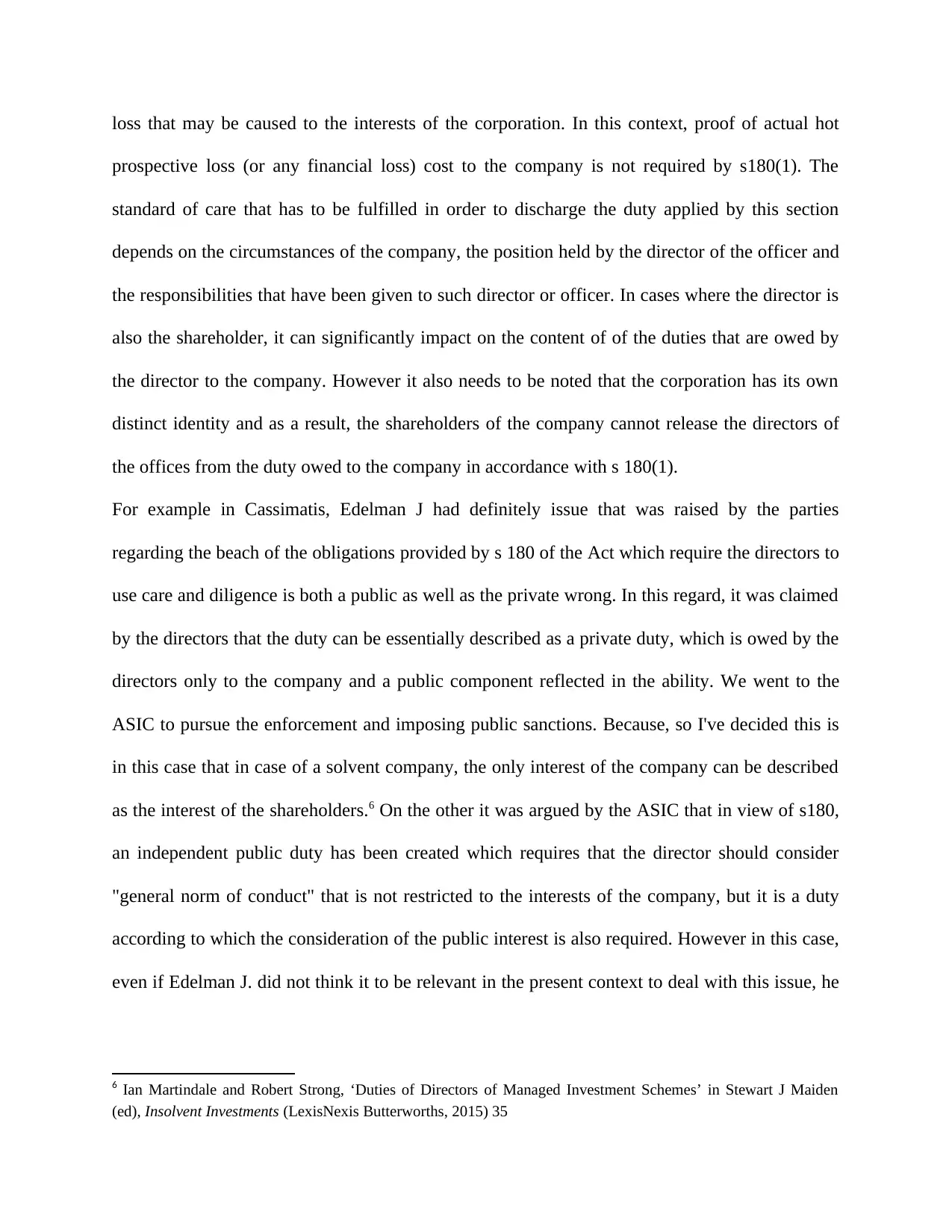
loss that may be caused to the interests of the corporation. In this context, proof of actual hot
prospective loss (or any financial loss) cost to the company is not required by s180(1). The
standard of care that has to be fulfilled in order to discharge the duty applied by this section
depends on the circumstances of the company, the position held by the director of the officer and
the responsibilities that have been given to such director or officer. In cases where the director is
also the shareholder, it can significantly impact on the content of of the duties that are owed by
the director to the company. However it also needs to be noted that the corporation has its own
distinct identity and as a result, the shareholders of the company cannot release the directors of
the offices from the duty owed to the company in accordance with s 180(1).
For example in Cassimatis, Edelman J had definitely issue that was raised by the parties
regarding the beach of the obligations provided by s 180 of the Act which require the directors to
use care and diligence is both a public as well as the private wrong. In this regard, it was claimed
by the directors that the duty can be essentially described as a private duty, which is owed by the
directors only to the company and a public component reflected in the ability. We went to the
ASIC to pursue the enforcement and imposing public sanctions. Because, so I've decided this is
in this case that in case of a solvent company, the only interest of the company can be described
as the interest of the shareholders.6 On the other it was argued by the ASIC that in view of s180,
an independent public duty has been created which requires that the director should consider
"general norm of conduct" that is not restricted to the interests of the company, but it is a duty
according to which the consideration of the public interest is also required. However in this case,
even if Edelman J. did not think it to be relevant in the present context to deal with this issue, he
6 Ian Martindale and Robert Strong, ‘Duties of Directors of Managed Investment Schemes’ in Stewart J Maiden
(ed), Insolvent Investments (LexisNexis Butterworths, 2015) 35
prospective loss (or any financial loss) cost to the company is not required by s180(1). The
standard of care that has to be fulfilled in order to discharge the duty applied by this section
depends on the circumstances of the company, the position held by the director of the officer and
the responsibilities that have been given to such director or officer. In cases where the director is
also the shareholder, it can significantly impact on the content of of the duties that are owed by
the director to the company. However it also needs to be noted that the corporation has its own
distinct identity and as a result, the shareholders of the company cannot release the directors of
the offices from the duty owed to the company in accordance with s 180(1).
For example in Cassimatis, Edelman J had definitely issue that was raised by the parties
regarding the beach of the obligations provided by s 180 of the Act which require the directors to
use care and diligence is both a public as well as the private wrong. In this regard, it was claimed
by the directors that the duty can be essentially described as a private duty, which is owed by the
directors only to the company and a public component reflected in the ability. We went to the
ASIC to pursue the enforcement and imposing public sanctions. Because, so I've decided this is
in this case that in case of a solvent company, the only interest of the company can be described
as the interest of the shareholders.6 On the other it was argued by the ASIC that in view of s180,
an independent public duty has been created which requires that the director should consider
"general norm of conduct" that is not restricted to the interests of the company, but it is a duty
according to which the consideration of the public interest is also required. However in this case,
even if Edelman J. did not think it to be relevant in the present context to deal with this issue, he
6 Ian Martindale and Robert Strong, ‘Duties of Directors of Managed Investment Schemes’ in Stewart J Maiden
(ed), Insolvent Investments (LexisNexis Butterworths, 2015) 35
⊘ This is a preview!⊘
Do you want full access?
Subscribe today to unlock all pages.

Trusted by 1+ million students worldwide
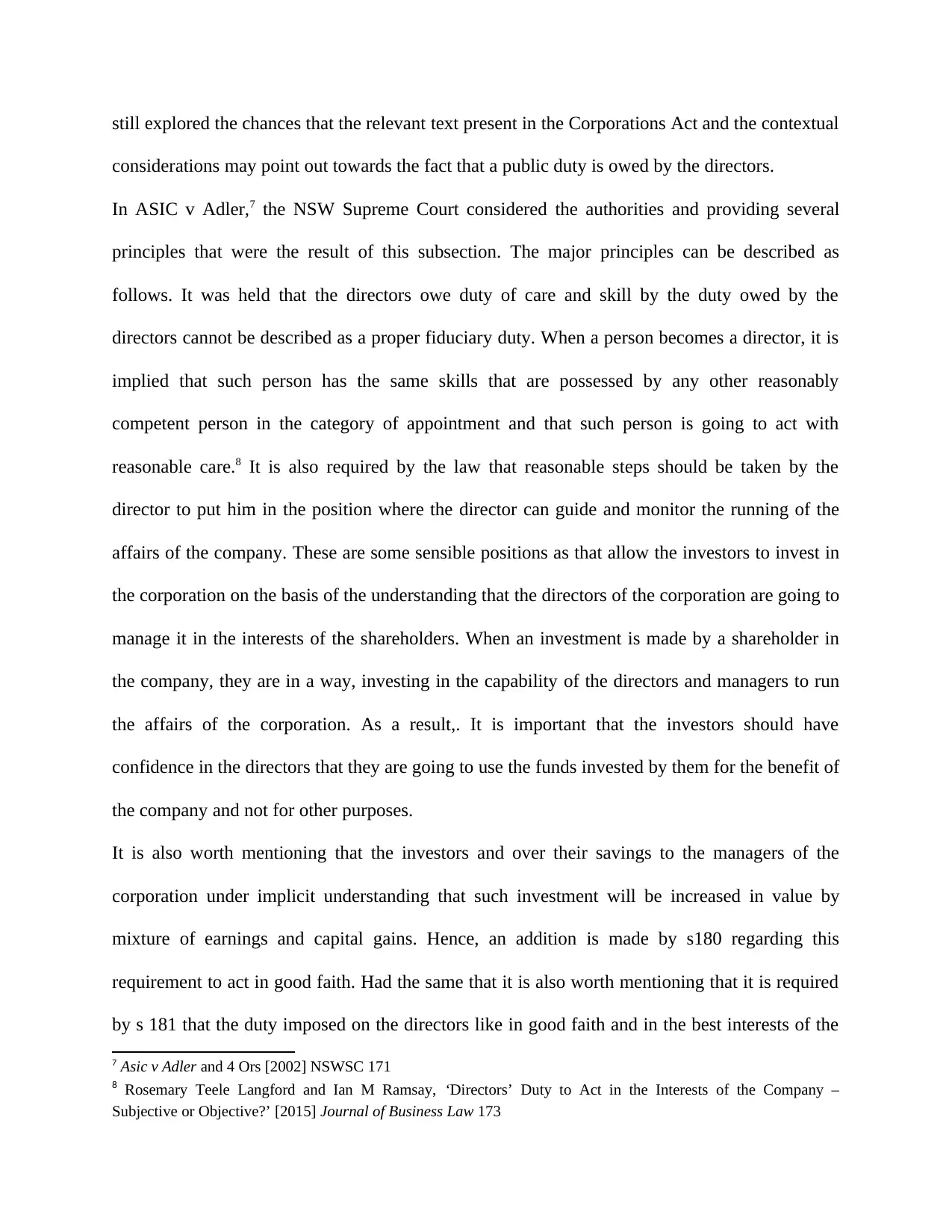
still explored the chances that the relevant text present in the Corporations Act and the contextual
considerations may point out towards the fact that a public duty is owed by the directors.
In ASIC v Adler,7 the NSW Supreme Court considered the authorities and providing several
principles that were the result of this subsection. The major principles can be described as
follows. It was held that the directors owe duty of care and skill by the duty owed by the
directors cannot be described as a proper fiduciary duty. When a person becomes a director, it is
implied that such person has the same skills that are possessed by any other reasonably
competent person in the category of appointment and that such person is going to act with
reasonable care.8 It is also required by the law that reasonable steps should be taken by the
director to put him in the position where the director can guide and monitor the running of the
affairs of the company. These are some sensible positions as that allow the investors to invest in
the corporation on the basis of the understanding that the directors of the corporation are going to
manage it in the interests of the shareholders. When an investment is made by a shareholder in
the company, they are in a way, investing in the capability of the directors and managers to run
the affairs of the corporation. As a result,. It is important that the investors should have
confidence in the directors that they are going to use the funds invested by them for the benefit of
the company and not for other purposes.
It is also worth mentioning that the investors and over their savings to the managers of the
corporation under implicit understanding that such investment will be increased in value by
mixture of earnings and capital gains. Hence, an addition is made by s180 regarding this
requirement to act in good faith. Had the same that it is also worth mentioning that it is required
by s 181 that the duty imposed on the directors like in good faith and in the best interests of the
7 Asic v Adler and 4 Ors [2002] NSWSC 171
8 Rosemary Teele Langford and Ian M Ramsay, ‘Directors’ Duty to Act in the Interests of the Company –
Subjective or Objective?’ [2015] Journal of Business Law 173
considerations may point out towards the fact that a public duty is owed by the directors.
In ASIC v Adler,7 the NSW Supreme Court considered the authorities and providing several
principles that were the result of this subsection. The major principles can be described as
follows. It was held that the directors owe duty of care and skill by the duty owed by the
directors cannot be described as a proper fiduciary duty. When a person becomes a director, it is
implied that such person has the same skills that are possessed by any other reasonably
competent person in the category of appointment and that such person is going to act with
reasonable care.8 It is also required by the law that reasonable steps should be taken by the
director to put him in the position where the director can guide and monitor the running of the
affairs of the company. These are some sensible positions as that allow the investors to invest in
the corporation on the basis of the understanding that the directors of the corporation are going to
manage it in the interests of the shareholders. When an investment is made by a shareholder in
the company, they are in a way, investing in the capability of the directors and managers to run
the affairs of the corporation. As a result,. It is important that the investors should have
confidence in the directors that they are going to use the funds invested by them for the benefit of
the company and not for other purposes.
It is also worth mentioning that the investors and over their savings to the managers of the
corporation under implicit understanding that such investment will be increased in value by
mixture of earnings and capital gains. Hence, an addition is made by s180 regarding this
requirement to act in good faith. Had the same that it is also worth mentioning that it is required
by s 181 that the duty imposed on the directors like in good faith and in the best interests of the
7 Asic v Adler and 4 Ors [2002] NSWSC 171
8 Rosemary Teele Langford and Ian M Ramsay, ‘Directors’ Duty to Act in the Interests of the Company –
Subjective or Objective?’ [2015] Journal of Business Law 173
Paraphrase This Document
Need a fresh take? Get an instant paraphrase of this document with our AI Paraphraser
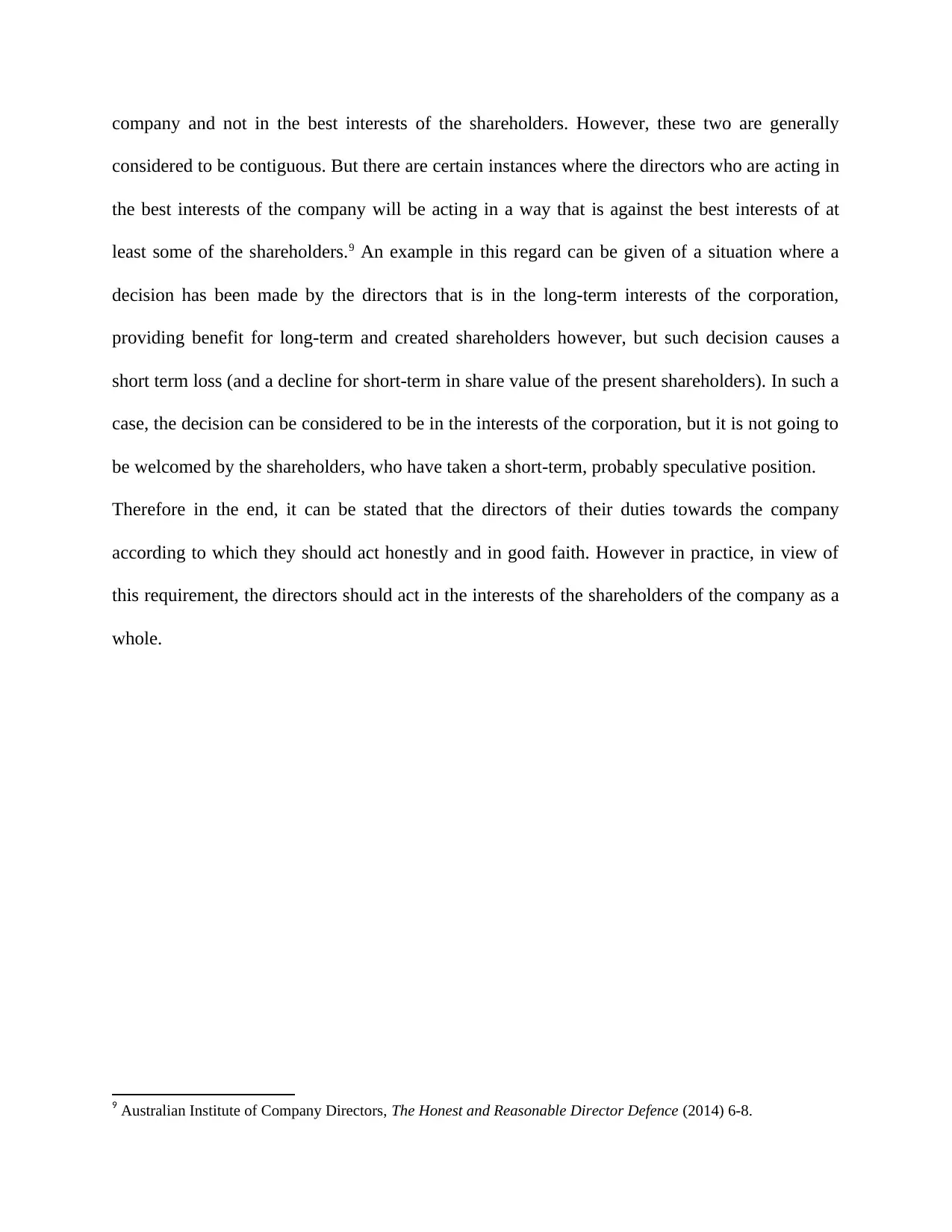
company and not in the best interests of the shareholders. However, these two are generally
considered to be contiguous. But there are certain instances where the directors who are acting in
the best interests of the company will be acting in a way that is against the best interests of at
least some of the shareholders.9 An example in this regard can be given of a situation where a
decision has been made by the directors that is in the long-term interests of the corporation,
providing benefit for long-term and created shareholders however, but such decision causes a
short term loss (and a decline for short-term in share value of the present shareholders). In such a
case, the decision can be considered to be in the interests of the corporation, but it is not going to
be welcomed by the shareholders, who have taken a short-term, probably speculative position.
Therefore in the end, it can be stated that the directors of their duties towards the company
according to which they should act honestly and in good faith. However in practice, in view of
this requirement, the directors should act in the interests of the shareholders of the company as a
whole.
9 Australian Institute of Company Directors, The Honest and Reasonable Director Defence (2014) 6-8.
considered to be contiguous. But there are certain instances where the directors who are acting in
the best interests of the company will be acting in a way that is against the best interests of at
least some of the shareholders.9 An example in this regard can be given of a situation where a
decision has been made by the directors that is in the long-term interests of the corporation,
providing benefit for long-term and created shareholders however, but such decision causes a
short term loss (and a decline for short-term in share value of the present shareholders). In such a
case, the decision can be considered to be in the interests of the corporation, but it is not going to
be welcomed by the shareholders, who have taken a short-term, probably speculative position.
Therefore in the end, it can be stated that the directors of their duties towards the company
according to which they should act honestly and in good faith. However in practice, in view of
this requirement, the directors should act in the interests of the shareholders of the company as a
whole.
9 Australian Institute of Company Directors, The Honest and Reasonable Director Defence (2014) 6-8.
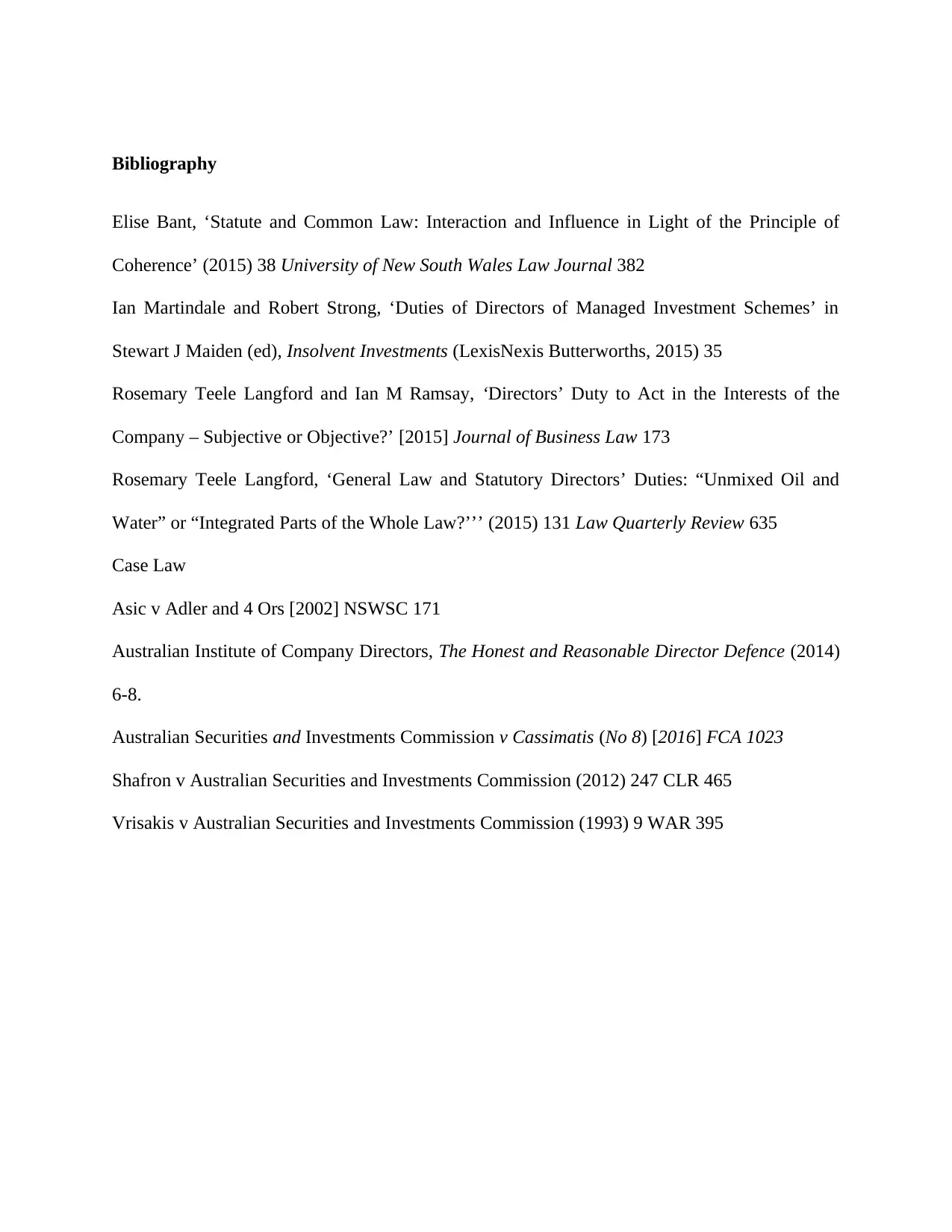
Bibliography
Elise Bant, ‘Statute and Common Law: Interaction and Influence in Light of the Principle of
Coherence’ (2015) 38 University of New South Wales Law Journal 382
Ian Martindale and Robert Strong, ‘Duties of Directors of Managed Investment Schemes’ in
Stewart J Maiden (ed), Insolvent Investments (LexisNexis Butterworths, 2015) 35
Rosemary Teele Langford and Ian M Ramsay, ‘Directors’ Duty to Act in the Interests of the
Company – Subjective or Objective?’ [2015] Journal of Business Law 173
Rosemary Teele Langford, ‘General Law and Statutory Directors’ Duties: “Unmixed Oil and
Water” or “Integrated Parts of the Whole Law?’’’ (2015) 131 Law Quarterly Review 635
Case Law
Asic v Adler and 4 Ors [2002] NSWSC 171
Australian Institute of Company Directors, The Honest and Reasonable Director Defence (2014)
6-8.
Australian Securities and Investments Commission v Cassimatis (No 8) [2016] FCA 1023
Shafron v Australian Securities and Investments Commission (2012) 247 CLR 465
Vrisakis v Australian Securities and Investments Commission (1993) 9 WAR 395
Elise Bant, ‘Statute and Common Law: Interaction and Influence in Light of the Principle of
Coherence’ (2015) 38 University of New South Wales Law Journal 382
Ian Martindale and Robert Strong, ‘Duties of Directors of Managed Investment Schemes’ in
Stewart J Maiden (ed), Insolvent Investments (LexisNexis Butterworths, 2015) 35
Rosemary Teele Langford and Ian M Ramsay, ‘Directors’ Duty to Act in the Interests of the
Company – Subjective or Objective?’ [2015] Journal of Business Law 173
Rosemary Teele Langford, ‘General Law and Statutory Directors’ Duties: “Unmixed Oil and
Water” or “Integrated Parts of the Whole Law?’’’ (2015) 131 Law Quarterly Review 635
Case Law
Asic v Adler and 4 Ors [2002] NSWSC 171
Australian Institute of Company Directors, The Honest and Reasonable Director Defence (2014)
6-8.
Australian Securities and Investments Commission v Cassimatis (No 8) [2016] FCA 1023
Shafron v Australian Securities and Investments Commission (2012) 247 CLR 465
Vrisakis v Australian Securities and Investments Commission (1993) 9 WAR 395
⊘ This is a preview!⊘
Do you want full access?
Subscribe today to unlock all pages.

Trusted by 1+ million students worldwide
1 out of 9
Related Documents
Your All-in-One AI-Powered Toolkit for Academic Success.
+13062052269
info@desklib.com
Available 24*7 on WhatsApp / Email
![[object Object]](/_next/static/media/star-bottom.7253800d.svg)
Unlock your academic potential
Copyright © 2020–2025 A2Z Services. All Rights Reserved. Developed and managed by ZUCOL.





